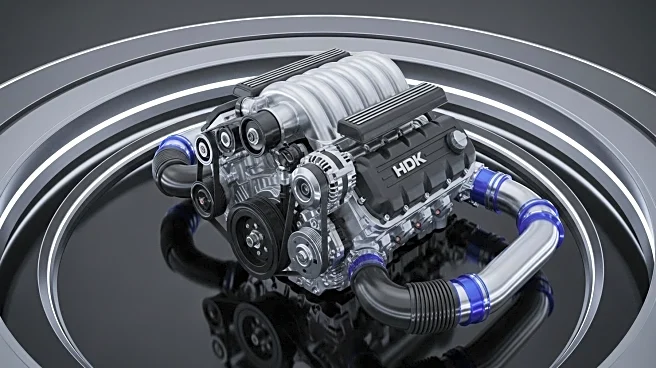What's Happening?
Dodge, known for its powerful muscle cars, is reportedly planning a return to V8 engines, supported by a significant investment from its parent company, Stellantis. According to a Bloomberg report, Stellantis is set to double its U.S. manufacturing investment from $5 billion to $10 billion. This investment aims to revitalize the Chrysler, Dodge, and Jeep brands, potentially leading to the development of a new Dodge V8 muscle car. The move comes as Dodge shifts away from its previous focus on electric vehicles, such as the Charger Daytona Banshee EV, which was intended to replace traditional gas-powered models. Instead, Dodge is preparing to launch the Charger Sixpack, featuring a twin-turbo inline-six engine, while still leaving room for a V8 option. Dodge CEO Matt McAlear hinted at the possibility of accommodating a V8 engine in the new Charger’s chassis, keeping enthusiasts hopeful for a return to the brand's iconic performance roots.
Why It's Important?
The potential return of Dodge's V8 muscle cars marks a significant shift in the automotive industry, particularly as many manufacturers are moving towards electrification. This decision could impact U.S. manufacturing jobs positively, as Stellantis plans to reopen facilities in Illinois and Michigan. The revival of V8 engines may also appeal to traditional car enthusiasts who value the performance and sound of internal combustion engines. However, this move contrasts with the broader industry trend towards sustainability and electric vehicles, raising questions about environmental impacts and regulatory challenges. The investment could strengthen Stellantis' position in the U.S. market, offering a diverse range of vehicles that cater to different consumer preferences.
What's Next?
Stellantis is expected to announce detailed plans for its $10 billion investment, which will clarify the future of Dodge's muscle car lineup. The automotive industry will be watching closely to see how Dodge balances modern engineering with traditional muscle car appeal. Stakeholders, including environmental groups and industry analysts, may react to Dodge's strategic pivot away from full electrification. The reopening of manufacturing facilities could lead to job creation, influencing local economies in Illinois and Michigan. As Dodge prepares to launch the Charger Sixpack, further developments regarding the potential inclusion of a V8 engine will be anticipated by enthusiasts and industry experts alike.
Beyond the Headlines
Dodge's decision to potentially revive V8 engines could spark discussions about the cultural significance of muscle cars in American history. The move may also influence other automakers to reconsider their electrification strategies, especially if Dodge's approach proves successful in the market. Additionally, the environmental implications of returning to internal combustion engines could lead to debates about sustainability and the automotive industry's role in climate change. Long-term shifts in consumer preferences and regulatory landscapes may be triggered by this development.









